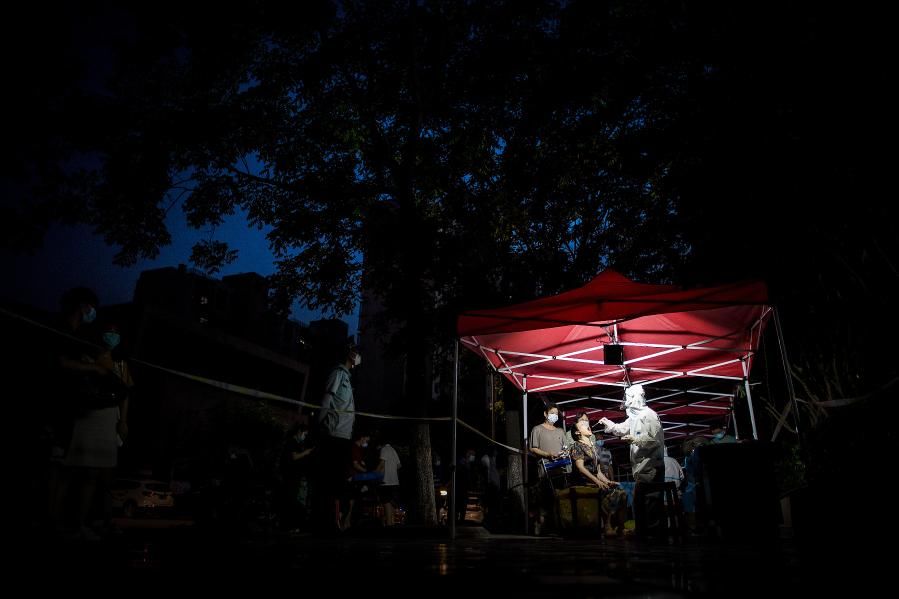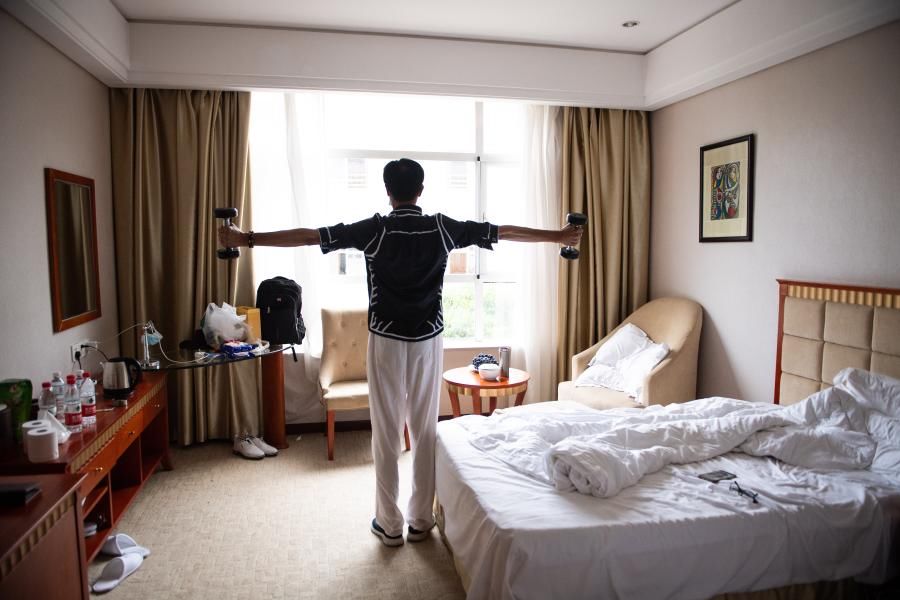no|Risking no lives, China’s anti-virus approach shows nation’s priority( 二 )

文章插图
A medical worker takes a swab sample from a resident for nucleic acid testing at a residential community in Wuhan, central China's Hubei Province, Aug. 3, 2021. (Xinhua/Xiao Yijiu)
Wuhan, the capital of Hubei, also reported new local infections among several migrant workers. Within five days, over 11.28 million residents in the megacity had been tested thanks to the efforts of over 28,000 medical workers in more than 2,800 sampling sites, the municipal government said.
"We worked in the laboratory around the clock to ensure reliable and timely test results," said Shao Lihua, director of the PCR laboratory of the KingMed Diagnostics in Wuhan. His department tested up to 28,000 nucleic acid samples in a single day.
Having experienced the epidemic outbreak last year, Shao said what impressed him most was that the country regards protecting people and their lives as its top priority.
Wuhan organized 21 medical experts covering respiratory, critical medicine, infection, iconography, and other disciplines, to provide tailored treatment for all COVID-19 patients, said Huang Chaolin, director of Wuhan Jinyintan Hospital.
In Changsha, capital of Hunan Province, community workers provided door-to-door nucleic acid testing and disinfection services in neighborhoods under closed-off management. Volunteers delivered living necessities and medicine for residents every day. On Aug. 13, the city cleared its medium and high-risk areas.
PEOPLE-CENTERED APPROACHES
Zhangjiajie, a popular tourist destination in Hunan Province, recently registered a new cluster of infections. Local authorities provided free accommodation and food for stranded visitors and arranged medical staff to conduct nucleic acid tests for tourists at hotels.

文章插图
Tourist Zhang Maodi from Shanghai exercises in his room at a quarantine hotel in Wulingyuan District of Zhangjiajie, central China's Hunan Province, Aug. 8, 2021. (Xinhua/Chen Sihan)
A psychological medical team provided mental health consulting to residents, tourists, and medical workers.
The province also organized experts in traditional Chinese medicine (TCM) to develop customized treatment programs for severe cases, moderate cases, mild ones, and asymptomatic carriers, respectively.
Since the outbreak, Yangzhou has established a rapid response mechanism and introduced relief measures for socially disadvantaged groups. The city had given living allowances totaling 3.7 million yuan (about 572,000 U.S. dollars) to 5,013 households as of Aug. 10.
The city also provided daily necessities and living subsidies to people in difficulties, especially persons with disabilities and children.
On Sunday, the first five patients were discharged from Yangzhou No.3 People's Hospital. They were transferred to another hospital for 14 days of recovery observation before returning to their communities.
"I am happy to see patients who are better and discharged from the hospital. It has greatly improved our confidence in the fight against the epidemic," said Shu Yusheng, president of Northern Jiangsu People's Hospital in Yangzhou.
"The nutrition recipe, mental health counseling, and rehabilitation training make us feel relieved. We have confidence in full recovery soon," said an asymptomatic patient who received rehabilitation treatment in Changde City, Hunan.■
【 no|Risking no lives, China’s anti-virus approach shows nation’s priority】(Written by Zhang Dan, Ma Xiaoran, Zhang Yujie, Zhang Ge, Yue Wenwan, Chen Shengyi. Video Reporters: Cheng Ji'an, Ding Chunyu; Video editor: Peng Ying.)
以上关于本文的内容,仅作参考!温馨提示:如遇专业性较强的问题(如:疾病、健康、理财等),还请咨询专业人士给予相关指导!
「辽宁龙网」www.liaoninglong.com小编还为您精选了以下内容,希望对您有所帮助:- China为“冰墩墩”、“雪容融”添加“China”元素
- misiAstronautas de Shenzhou-13 de China completan segunda misión extravehicular
- ChinasGLOBALink | Eine aufschlussreiche Reise zum US-sanktionierten Polysiliziumwerk in Xinjiang
- China'sGLOBALink | All 90 members of HKSAR's 7th-term LegCo elected
- XinhuaInside China Ep.7: How is life in China?
- mutualXinhua Headlines: Important opportunity for deeper Nicaragua-China cooperation as ties resume
- chainsChina moves to stabilize production, supply chains amid latest COVID outbreak
- capital China holds national memorial ceremony for Nanjing Massacre victims
- setChina's entry into WTO a win-win result | Stories shared by Xi Jinping
- newThree ordinary Taiwan locals who made new lives across the Strait
